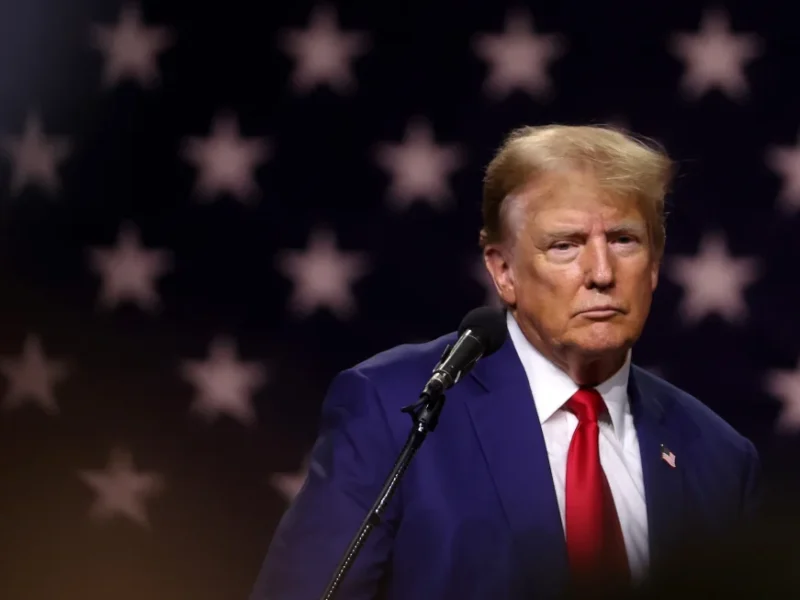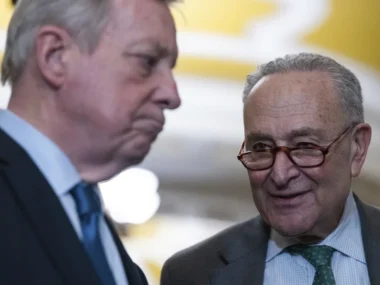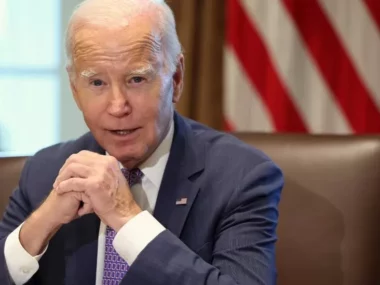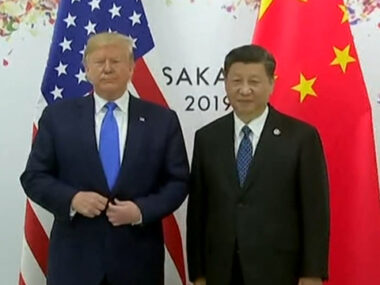Donald Trump’s authoritarian image has always included a subtle suggestion of violence. As he approaches his first trial and the upcoming general election, he’s intensifying his rhetoric, contributing to a tense political environment.
Recently, he stirred controversy by sharing a video featuring a pickup truck with an image of a restrained President Joe Biden. Additionally, Trump has escalated verbal attacks on Judge Juan Merchan, who will oversee his New York hush money case. He’s also targeted the judge’s daughter, who has ties to Democratic campaigns, in an attempt to undermine the case against him.
While this behavior is typical of Trump, the looming trials and election context magnifies its significance. Unlike any other Republican nominee or former president, Trump’s continuous threats and disrespect towards judges and the legal system are unprecedented. Despite facing gag orders in various cases, Trump persists in his aggressive conduct.
Retired Superior Court Judge LaDoris Cordell highlighted the unprecedented disrespect Trump shows towards the court system. However, the Republican Party largely turns a blind eye to or justifies Trump’s actions due to his immense influence within the party. Standing up to him often leads to political downfall, as evidenced by the fate of promising politicians. Many grassroots voters support Trump’s behavior, viewing it as anti-establishment.
Trump and his supporters justify his criticism of the legal system as a response to political persecution from Democrats, particularly Biden. However, this narrative overlooks the serious charges against Trump, such as his efforts to overturn the 2020 election. Despite operating within a legal system with ample protections for defendants, Trump continues to portray himself as a victim. This narrative resonates with his legal defense and campaign themes, despite distorting reality.
Two recent CNN interviews underscored the legal, constitutional, and political ramifications of Trump’s behavior. Republican Rep. Mike Lawler’s interview with Dana Bash on “State of the Union” showcased the challenges traditional GOP lawmakers face in navigating Trump’s influence while maintaining political viability. Lawler’s district is crucial for the GOP’s hopes of defending the House in the upcoming elections, highlighting the delicate balance many Republican politicians must strike in the Trump era.
Judge Walton issued a cautionary statement.
US District Judge Reggie Walton, a highly respected figure in Washington, DC’s legal circles, recently spoke to CNN’s Kaitlan Collins about the alarming consequences of former President Trump’s verbal attacks on judges and the courts.
Judge Walton emphasized the serious security risks posed by Trump’s rhetoric and its detrimental effects on the justice system. He highlighted the importance of judges being able to carry out their duties without fear of physical harm, emphasizing that such threats, especially when directed at judges’ families, undermine the rule of law.
Having been appointed to judicial positions by Presidents George H.W. Bush and George W. Bush, Walton warned against the dangers of rhetoric that singles out judges, making them vulnerable to physical assaults. He acknowledged the unfortunate reality that such attacks are not inconceivable and emphasized the need to prevent them from occurring.
In past instances, Walton criticized Trump’s followers for their assault on the US Capitol, stating that such actions tarnish America’s reputation as a beacon of democracy. Despite warnings from senior judges like Walton, Trump is unlikely to change his inflammatory behavior, as it has proven politically effective for him. Trump often complains about bias among judges and prosecutors, using such rhetoric to discredit unfavorable outcomes in court.
Trump’s recent attacks on Judge Merchan, for instance, demonstrate a pattern likely to intensify leading up to the upcoming trial. While these attacks may not directly violate a partial gag order, they undoubtedly raise security concerns for Merchan and his family. Prosecutors have requested clarification on whether the gag order extends to family members of the judge and other officials involved in the case.
Judge Tanya Chutkan, who presides over a federal election interference case in DC, also faced increased security measures due to similar concerns. Trump’s assaults on the judiciary align with his political narrative of being an outsider challenging a corrupt system. He portrays himself as a victim of political persecution and garners support by championing his followers who have faced legal consequences for their actions.
Trump’s attacks on prosecutors like Fani Willis and Letitia James further fuel his narrative of political persecution, resonating strongly with his base. However, these attacks undermine the impartiality of the legal system and erode trust in its fairness. By politicizing the judiciary, Trump jeopardizes the foundation of democracy and perpetuates the notion that the rule of law is not applied equally to all citizens.
Even Chief Justice John Roberts has cautioned against such partisan categorization of judges, emphasizing the importance of an independent judiciary. Trump’s attempts to undermine judicial independence align with the playbook of aspiring autocrats, who seek to weaken institutions of accountability when in power.
Trump’s approach carries significant political risks.
While the former president’s aggressive stance against the judiciary and his fiery reactions to his legal challenges initially energized his primary campaign, he now faces potential political backlash.
With a rematch looming this fall, Biden’s campaign is capitalizing on Trump’s erratic behavior to portray him as a grave threat to democracy and the rule of law, casting doubt on his suitability for the Oval Office. Biden’s campaign spokesperson condemned Trump’s sharing of the image depicting violence against the president and highlighted Trump’s history of inciting political violence, referencing the January 6 Capitol insurrection. In response, Trump’s campaign spokesperson accused Democrats and unnamed individuals of endorsing violence against Trump and criticized the weaponization of the legal system.
Senior Republicans, some of whom have endorsed Trump, often evade questions about such incidents or attempt to distance themselves from Trump’s behavior. However, they recognize the political impossibility of openly rebuking Trump.
In a recent interview, an emerging New York Republican, Lawler, attempted to steer the conversation away from Trump’s rhetoric towards broader issues affecting Americans. Nevertheless, Trump’s rhetoric continues to dominate the political discourse, overshadowing discussions on critical issues like the economy, healthcare, and law enforcement.
If Trump faces electoral defeat, his inflammatory rhetoric may be partly to blame. Conversely, if he wins, it could set the stage for a tumultuous presidency characterized by ongoing controversy and conflict.











